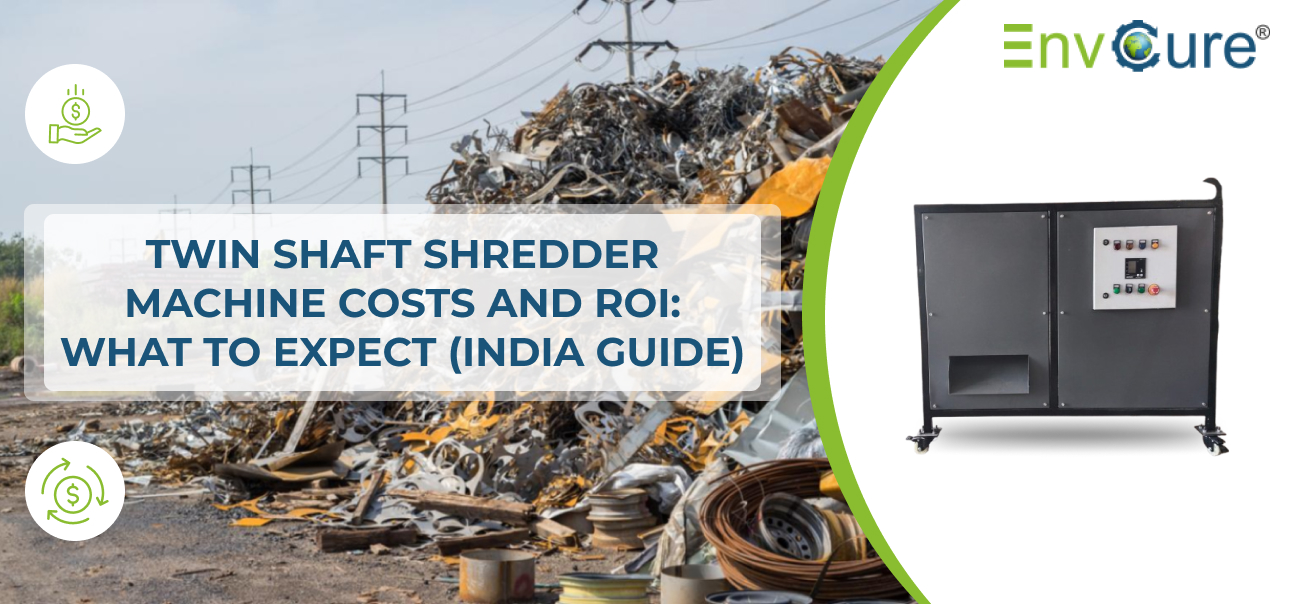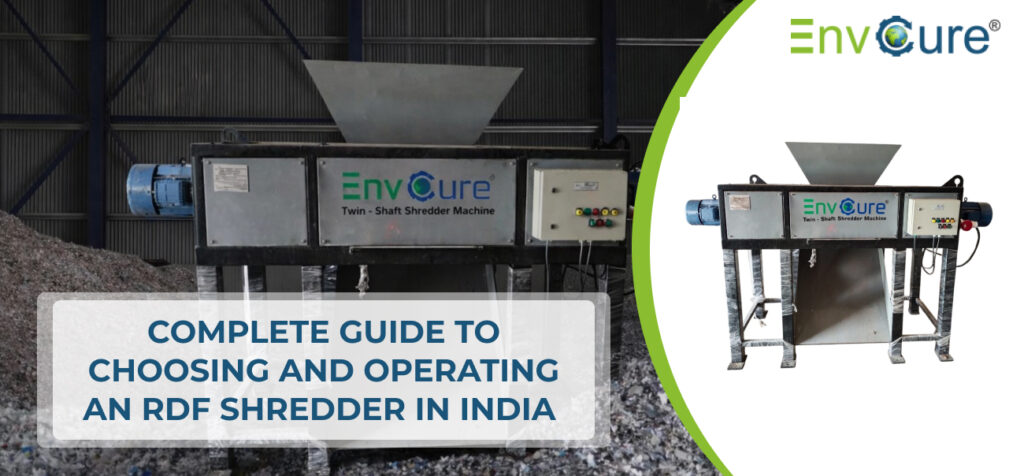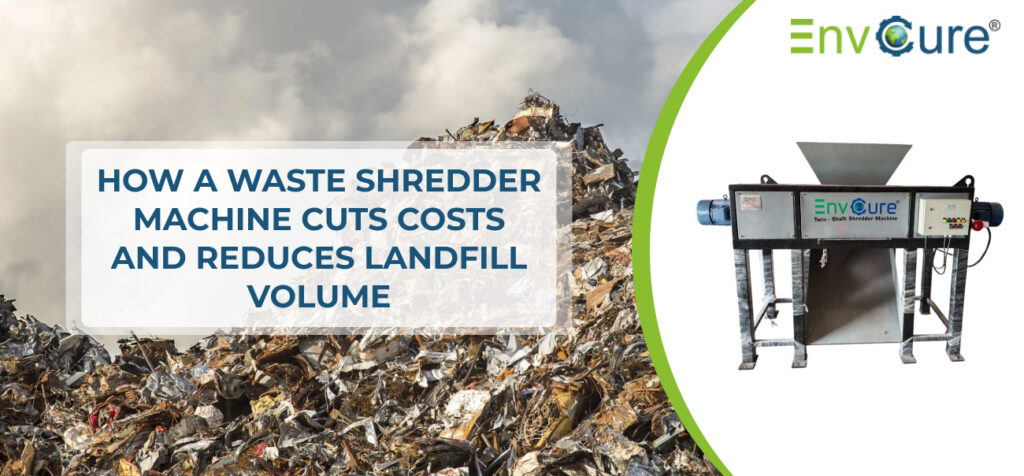India’s waste management challenges are getting bigger but a Twin Shaft Shredder Machine can help. This guide explores compact to heavy-duty machine costs and ROI via savings & revenue. Pricing factors, market trends, real-world applications, value and maximizing strategies. For a recycler, municipality or business this article gives clear insights on how to invest in sustainable waste management equipment.
Overview: Twin Shaft Shredder Machine
- The Twin Shaft Shredder Machine prices in India range from ₹ 85,000 to ₹ 125 lakh depending on the capacity, power and automation features.
- Machine size, motor strength, blade quality and add-ons like conveyors affect costs.
- ROI comes from lower disposal costs, recycling revenue and operational efficiencies typically realised in 1-3 years.
- Dual shaft shredder supports India’s recycling and municipal waste sectors.
- Shredders for municipal & industrial use from EnvCure Technocrat LLP are tough and reliable shredders.
What Is a Twin Shaft Shredder Machine?
A Twin Shaft Shredder Machine is a heavy duty industrial machine used for reducing shredding hard materials such as plastic, metal & organic waste. It has dual rotating shafts with sharp blades that shred waste so it is an absolute must for India’s waste management sector. Able to process many different waste streams they are considered industrial shredders and due to their durability and through-put they represent a long term value.
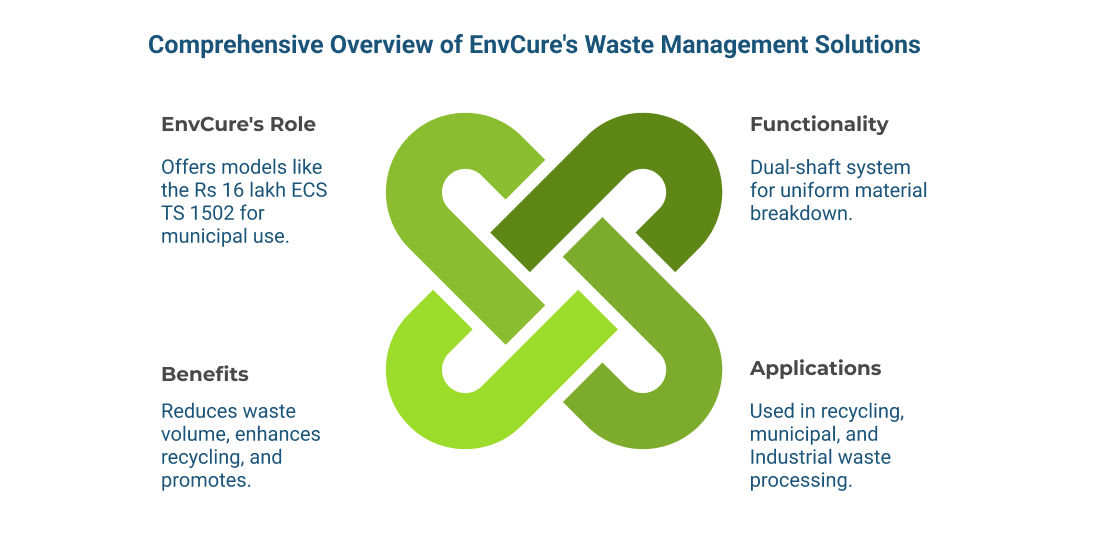
- Functionality: Two counter-rotating shafts with blades break material apart for uniform output.
- Applications: Used in recycling, municipal waste processing & industrial waste management.
- Benefits: Low waste volume, high recycling and sustainable operations.
- EnvCure’s Role: Offers models like the Rs 16 lakh ECS TS 1502 for municipal use.
You can also explore our detailed article: Twin Shaft Shredder Machine for Municipal Solid Waste – A Smart Solution, to understand its benefits.
Factors Driving Twin Shaft Shredder Costs in India
The price of Twin Shaft Shredder Machine is quite different according to some particular factors. The main driver is capacity with smaller units processing 25-100 kg / hr and larger ones more than 5 ton / hr. Motor power affects performance and price, higher speeds increase costs but improve throughput. Blade quality usually hardened steel gives long life, though add-ons such as conveyors increase the original outlay and save labour costs.
- Capacity: Ranges from 25 kg/hr (₹85,000) to 10 tons/hr (₹75 lakh).
- Motor Power: 5-100 HP models; Higher power adds cost but improves efficiency.
- Blade Durability: Quality steel blades mean fewer replacements.
- Add-Ons: Automation and conveyors raise prices but improve operations.
- Local Production: Indian manufacturers like EnvCure keep costs lower than imports.
The below table gives an insight onto how to choose twin shaft shredder capacity.
| Capacity (kg/hr) | Power (HP) | Price Range (₹) | Example Use |
| 25-100 | 2-7.5 | ₹85,000 – ₹8 lakh | Small-scale plastic recycling |
| 500-1000 | 10-20 | ₹8.2 lakh – ₹20 lakh | Municipal waste processing |
| 2000+ | 30+ | ₹20 lakh – ₹80 lakh | Heavy-duty industrial shredding |
Types of Shredders and Their Price Ranges
India has a diverse shredder market for different needs. A double shaft shredder starts at ₹1.9 lakh for basic units and is suitable for heavy material. Specialized shredders serve niche applications and prices reflect the design and features so there is a fit for most every business waste management goal.
- Twin shaft shredder machine for municipal waste: Starts at ₹8.2 lakh for mixed city waste.
- Twin shaft shredder for plastic recycling: Approximately ₹ 2.25 lakh for PET bottles/packaging.
- E-waste shredder: Designed for safe electronics processing, priced at ₹5 lakh +.
- Tire shredding/rubber waste shredding: These heavy-duty units priced at ₹25 lakh + are built for tough materials.
- Industrial shredders: For high volume tasks often over ₹15 lakh, automated models are used.
Market Trends Shaping Costs in 2025 and Beyond
Urbanization and tighter waste regulations are driving a 9-10% growth in India’s shredder market every year. Dual shaft shredders are in high demand in recycling and municipal sectors as India looks for sustainability. Rising raw material costs raise prices 5-7% but local manufacturing keeps them competitive. Government subsidies further reduce effective costs, making waste shredder machines attractive investments.
- Regulatory Push: Shredders are in demand because of policies like Swachh Bharat.
- Urban Growth: Rising waste volumes in cities require efficient equipment.
- Subsidies: Government schemes cut costs of sustainable tech investments.
- Local Manufacturing: Lowers import duties and stabilizes prices for buyers.
Calculating ROI for Twin Shaft Shredders
ROI equals (Net Profit/Total Investment) x 100. Lower disposal costs, recycling revenue and operational efficiencies drive profits. Payback periods are normally between 1 to 3 years throughout India, given waste volume and machine capacity, which renders these shredders a sound investment.
- Disposal Savings: Shredding 50-70% of waste volume reduces transport costs.
- Recycling Revenue: Processing materials like plastics fetch ₹10-50/kg.
- Operational Gains: Automation lowers labour & energy costs.
- Example: A ₹10 lakh machine saving ₹5 lakh annually and earning ₹3 lakh in sales yields 80% ROI in year one.
Choosing the Right Twin Shaft Shredder Capacity
The right capacity ensures maximum ROI with your Twin Shaft Shredder Machine. Small operations (100-500 kg / hr) need compact models, large (1-5 tons / hr) need heavy-duty units. Matching rotor/shaft speed (RPM) to materials usually higher for soft waste and lower for tough to shred items like tyre optimizes performance. EnvCure’s flexible models help businesses select low cost solutions.
- Small Operations: 100-500 kg/hr for local recycling or small businesses.
- Large Facilities: 1-5 tons/hr for municipal or industrial processing.
- Material Matching: RPM for plastics should be high or low, depending on the tire.
- Cost-Benefit: Capacity should not exceed budget.
Maintenance and Long-Term Costs
Upfront costs are part of the equation. Maintenance gives a Twin Shaft Shredder Machine 8-10 years of service. Blades need replacing every 6-12 months for 10-15% of the machine price. Energies used range from 10-30 kWh/hr, depending on power. Regular servicing reduces downtime, and India has access to local parts, containing costs over the long haul.
- Blade Replacement: Usually ₹20,000-₹2 lakh every 3-12 months.
- Energy Costs: High-capacity units: ₹5,000- ₹8,000/month.
- Servicing: An annual maintenance of 5-10% of purchase price.
- Local Parts: Reasonable spares reduce repair costs.
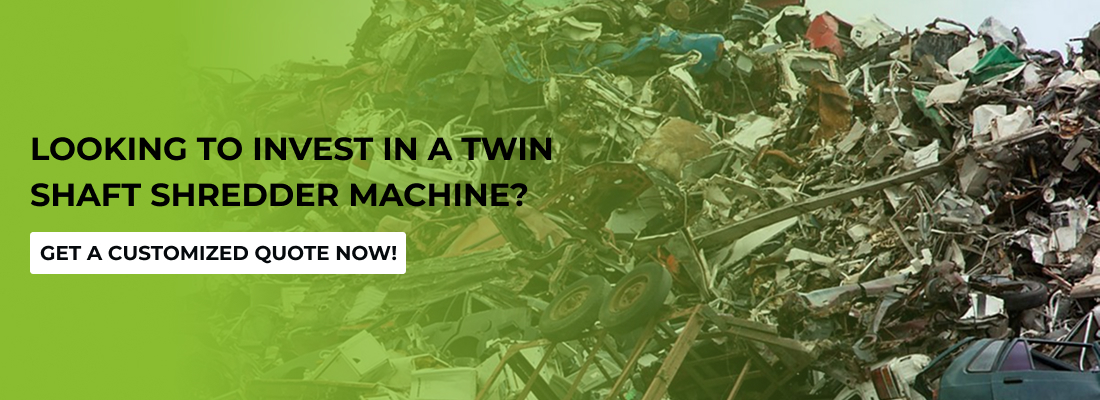
Why Choose EnvCure for Your Shredding Needs?
Twin Shaft Shredder Machines at EnvCure Technocrat LLP offer affordability with performance. Designed for municipal waste, plastics and e-waste, our shredders help businesses and cities become sustainable while saving money. From compact to heavy-duty models contact us for a tailored quote or demo. Our dual shaft shredders and waste shredder machines are built for performance. Make waste challenges profitable & join us for a greener India.
(**Please note that the prices listed above are tentative and may vary based on the client’s specific requirements, add-on features, technical parameters, and any upgrades.**)
FAQs Related to Twin Shaft Shredder Machine:
Q.1. How do I choose the right twin shaft shredder for my material / application?
Ans. Choose based on your material type, required output size, and processing capacity. Light waste needs standard models, while metals, e-waste, or bulky waste require heavy-duty shredders with high torque.
Q2. What power / motor / speed / torque specifications are required?
Ans. Most twin shaft shredders run at low speed and high torque. Light materials need lower motor power, while tougher materials like metals and tires require stronger motors and higher torque.
Q.3. What kinds of materials can twin shaft shredders process / cannot process?
Ans. Can process: plastics, paper, rubber, wood, e-waste, light metals, MSW, and tires.
Cannot process: very hard reinforced metals, sticky/wet organic waste (unless customized), or hazardous/explosive materials.




